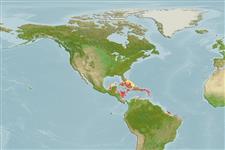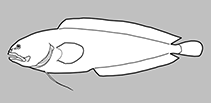Ogilbichthys kakuki Møller, Schwarzhans & Nielsen, 2004
Kakuk's coralbrotula| Native range | All suitable habitat | Point map | Year 2050 |

|
| This map was computer-generated and has not yet been reviewed. |
| Ogilbichthys kakuki AquaMaps Data sources: GBIF OBIS |
Google imageNo image available for this species;
drawing shows typical species in Dinematichthyidae.
Classification / Names Common names | Synonyms | Catalog of Fishes(genus, species) | ITIS | CoL | WoRMS | Cloffa
Etymology: Ogilbichthys: Named for the great Australian ichthyologist, J. Douglas Ogilby; kakuki: Named for Brian Kakuk, Caribbean Marine Research Center, Lee Stocking Island, Bahamas.
Eponymy: James Douglas Ogilby (1853–1925) was an Irish-born Australian ichthyologist and taxonomist, son of the famous zoologist William Ogilby (below). [...] Brian Kakuk was a US Navy Diver (1981–1988) who then moved to the Bahamas, where he is co-owner, Bahamas Underground Cave Diving Facility and Diving Safety Officer, Caribbean Marine Research Center, Lee Stocking Island, Bahamas. [...] (Ref. 128868), visit book page.
More on authors: Møller, Schwarzhans & Nielsen.
Environment: milieu / climate zone / depth range / distribution range Ecology
Distribution Territories | FAO areas | Ecosystems | Occurrences | Point map | Introductions | Faunafri
Size / Weight / Age
Short description Identification keys | Morphology | Morphometrics
Life cycle and mating behavior Maturity | Reproduction | Spawning | Eggs | Fecundity | Larvae
Main reference
Upload your references | References | Coordinator | Collaborators
IUCN Red List Status (Ref. 130435: Version 2025-2)
CITES
Threat to humans
Human uses
More information
Food items (preys)
Diet composition
Food consumption
Food rations
Predators
Growth parameters
Max. ages / sizes
Length-weight rel.
Length-length rel.
Length-frequencies
Mass conversion
Recruitment
Abundance
Reproduction
Maturity
Maturity/Gills rel.
Fecundity
Spawning
Spawning aggregations
Eggs
Egg development
Larvae
Larval dynamics
Gill area
Brain
Otolith
Body composition
Nutrients
Oxygen consumption
Swimming type
Swimming speed
Visual pigments
Fish sound
Diseases & Parasites
Toxicity (LC50s)
Genome
Genetics
Heterozygosity
Heritability
Genetic Diversity
Aquaculture systems
Aquaculture profiles
Strains
Ciguatera cases
Stamps, coins, misc.
Tools
Special reports
Download XML



